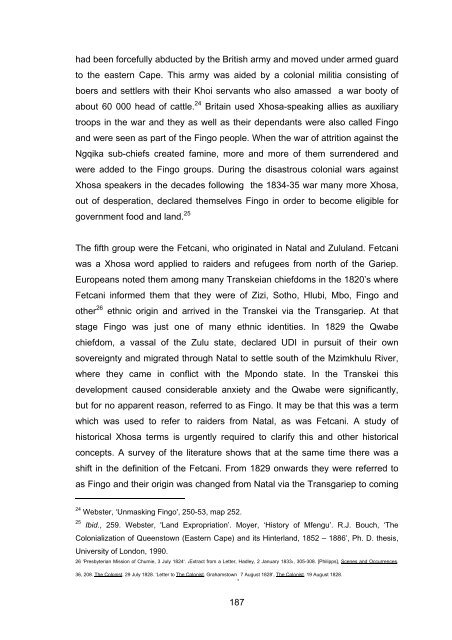The Historiographical Development of the Concept “mfecane” and ...
The Historiographical Development of the Concept “mfecane” and ...
The Historiographical Development of the Concept “mfecane” and ...
Create successful ePaper yourself
Turn your PDF publications into a flip-book with our unique Google optimized e-Paper software.
had been forcefully abducted by <strong>the</strong> British army <strong>and</strong> moved under armed guard<br />
to <strong>the</strong> eastern Cape. This army was aided by a colonial militia consisting <strong>of</strong><br />
boers <strong>and</strong> settlers with <strong>the</strong>ir Khoi servants who also amassed a war booty <strong>of</strong><br />
about 60 000 head <strong>of</strong> cattle. 24 Britain used Xhosa-speaking allies as auxiliary<br />
troops in <strong>the</strong> war <strong>and</strong> <strong>the</strong>y as well as <strong>the</strong>ir dependants were also called Fingo<br />
<strong>and</strong> were seen as part <strong>of</strong> <strong>the</strong> Fingo people. When <strong>the</strong> war <strong>of</strong> attrition against <strong>the</strong><br />
Ngqika sub-chiefs created famine, more <strong>and</strong> more <strong>of</strong> <strong>the</strong>m surrendered <strong>and</strong><br />
were added to <strong>the</strong> Fingo groups. During <strong>the</strong> disastrous colonial wars against<br />
Xhosa speakers in <strong>the</strong> decades following <strong>the</strong> 1834-35 war many more Xhosa,<br />
out <strong>of</strong> desperation, declared <strong>the</strong>mselves Fingo in order to become eligible for<br />
government food <strong>and</strong> l<strong>and</strong>. 25<br />
<strong>The</strong> fifth group were <strong>the</strong> Fetcani, who originated in Natal <strong>and</strong> Zulul<strong>and</strong>. Fetcani<br />
was a Xhosa word applied to raiders <strong>and</strong> refugees from north <strong>of</strong> <strong>the</strong> Gariep.<br />
Europeans noted <strong>the</strong>m among many Transkeian chiefdoms in <strong>the</strong> 1820’s where<br />
Fetcani informed <strong>the</strong>m that <strong>the</strong>y were <strong>of</strong> Zizi, Sotho, Hlubi, Mbo, Fingo <strong>and</strong><br />
o<strong>the</strong>r 26 ethnic origin <strong>and</strong> arrived in <strong>the</strong> Transkei via <strong>the</strong> Transgariep. At that<br />
stage Fingo was just one <strong>of</strong> many ethnic identities. In 1829 <strong>the</strong> Qwabe<br />
chiefdom, a vassal <strong>of</strong> <strong>the</strong> Zulu state, declared UDI in pursuit <strong>of</strong> <strong>the</strong>ir own<br />
sovereignty <strong>and</strong> migrated through Natal to settle south <strong>of</strong> <strong>the</strong> Mzimkhulu River,<br />
where <strong>the</strong>y came in conflict with <strong>the</strong> Mpondo state. In <strong>the</strong> Transkei this<br />
development caused considerable anxiety <strong>and</strong> <strong>the</strong> Qwabe were significantly,<br />
but for no apparent reason, referred to as Fingo. It may be that this was a term<br />
which was used to refer to raiders from Natal, as was Fetcani. A study <strong>of</strong><br />
historical Xhosa terms is urgently required to clarify this <strong>and</strong> o<strong>the</strong>r historical<br />
concepts. A survey <strong>of</strong> <strong>the</strong> literature shows that at <strong>the</strong> same time <strong>the</strong>re was a<br />
shift in <strong>the</strong> definition <strong>of</strong> <strong>the</strong> Fetcani. From 1829 onwards <strong>the</strong>y were referred to<br />
as Fingo <strong>and</strong> <strong>the</strong>ir origin was changed from Natal via <strong>the</strong> Transgariep to coming<br />
24 Webster, ‘Unmasking Fingo', 250-53, map 252.<br />
25 Ibid., 259. Webster, 'L<strong>and</strong> Expropriation’. Moyer, ‘History <strong>of</strong> Mfengu’. R.J. Bouch, ‘<strong>The</strong><br />
Colonialization <strong>of</strong> Queenstown (Eastern Cape) <strong>and</strong> its Hinterl<strong>and</strong>, 1852 – 1886’, Ph. D. <strong>the</strong>sis,<br />
University <strong>of</strong> London, 1990.<br />
26 'Presbyterian Mission <strong>of</strong> Chumie, 3 July 1824'. ‘ Extract from a Letter, Hadley, 2 January 1833 ’ , 305-308. [Philipps], Scenes <strong>and</strong> Occurrences,<br />
36, 208. <strong>The</strong> Colonist, 29 July 1828. ‘Letter to <strong>The</strong> Colonist, Grahamstown , 7 August 1828’, <strong>The</strong> Colonist, 19 August 1828.<br />
187

















